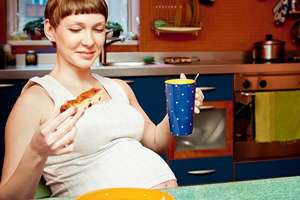Restricting food and fluids during labor is unwarranted

Despite the longstanding, widespread practice of restricting women's food and fluid intake during labor, a large-scale analysis in The Cochrane Library finds no need for these restrictions and supports women eating and drinking as they please.
"There should be no hospital policies which restrict fluids and foods in labor; nor should formal guidelines tell women to take specific foods, such as energy drinks," states one of the study's authors, Gillian ML Gyte, M.Phil, of the department of women and children's health at the University of Liverpool in the U.K.
She and her co-authors point out that prior research has shown that many women in labor do not feel like eating, but for others the notion of long hours without any food or drink can be anxiety provoking.
In some cultures, women eat and drink as they like during labor both for nourishment and comfort. However, in Western industrialized societies, physicians have often restricted women's fluid and food intake during labor in case a caesarean section and general anesthesia are necessary later. The restrictions largely grew out of one 1940s study, which showed that during general anesthesia, women run an increased risk of having their stomach contents enter their lungs, which can be dangerous or even life-threatening.
But today, caesarean sections are most often performed using regional anesthesia and safer, more modern general anesthesia techniques reduce the risk of aspiration. Women on food and fluid restrictions often do receive ice chips and/or intravenous (IV) fluids but IV fluids themselves come with medical risks.
The meta-analysis included five studies with a combined total of 3,130 women; all five involved women considered at low-risk for needing general anesthesia during labor. The analysis was dominated by one large trial involving 2,443 women.
For both mothers and newborns, the authors compared the effects of food-and-drink restrictions with no such restrictions.
The three primary outcomes reviewed for women were having a caesarean section, having a vaginal birth, and the mother's satisfaction with the birth. The two primary outcomes reviewed for infants were Apgar scores and blood glucose levels.
"Our study found no difference in the outcomes measured, in terms of the babies' wellbeing or the likelihood of a woman needing a C-section," said Gyte. "There is no evidence of any benefit to restricting what women eat and drink in labor." The researchers also emphasize the value of allowing women to make choices regarding these matters.
Gargey Patil, M.D., an obstetrician with Florida Hospital in Orlando, said that he would seriously consider applying these new findings in his own care for women in labor, after consulting with anesthesiologist colleagues. The findings indicate, he said, that, "Most of us are still practicing what may be unproven and probably unnecessary restrictions from the point of view of what is most beneficial for patients."
The authors call for further study of what might be effective nutrient and hydration strategies for women in labor, in light of the frequent use today of practices such as epidurals and the stimulation of labor with oxytocin.

















